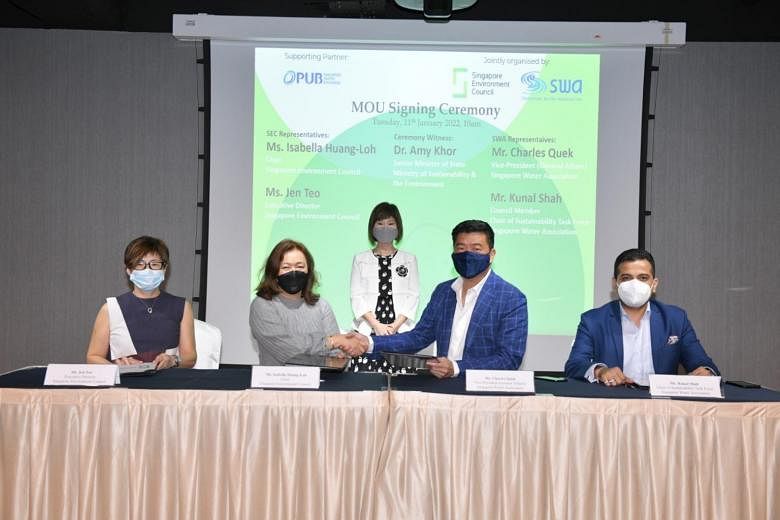SINGAPORE - Greater collaboration between organisations can help Singapore transition towards a circular economy to enhance sustainability efforts.
In the case of the Singapore Environment Council (SEC) and the Singapore Water Association (SWA), it can enable SWA members to tap SEC's programmes in order to develop new capabilities in sustainability that would be applicable within and beyond the water industry.
Similarly, SWA members can learn from their counterparts at the SEC through sharing sessions and sustainability workshops between the two organisations.
Said Senior Minister of State for Sustainability and the Environment Amy Khor: "Sustainable development with finite resources means that we need to be efficient in our resource utilisation.
"A circular economy model allows us to reuse resources repeatedly, reduce the need to constantly exploit new resources and tap into new areas of growth."
Dr Khor was speaking during the signing ceremony of a memorandum of understanding (MOU) between the SEC and SWA on Tuesday (Jan 11) at the PUB Water Hub Auditorium in Toh Guan.
SEC chairman Isabella Huang-Loh said: "Leveraging SEC's appointment as a partner in Enterprise Singapore's Enterprise Sustainability Programme, SEC will assist SWA members to enhance their individual capability and capacity building required to jump-start innovations and sustainable development."
Mr Charles Quek, vice-president of the SWA, said that both organisations would also collaborate on outreach and education events, publicity and promotion campaigns, as well as encourage and assist SWA members to secure SEC's certifications over the next 18 months.
To that end, Ms Huang-Loh said that the SEC has begun issuing Singapore Green Labelling Scheme certifications for industrial water equipment, which includes high-pressure waterjets, commercial washer extractors and dishwashers.
Speaking at a sharing session "Water-Food-Energy Nexus: Towards a Circular Business Economy" after the signing ceremony, Mr Kunal Shah said that the large amounts of water used in the production of fuels and technologies to move the energy sector away from fossil fuels towards zero carbon energy sources could lead to water stress.
"Electric vehicles rely on batteries, which require a lot of freshwater to produce, as it creates a lot of waste water.
"The production of biodiesel, sustainable aviation fuels, hydrogen through electrolysis and carbon capture all require a lot of water," said Mr Shah, who chairs the SWA's sustainability task force.
Emphasising the importance of sustainable development for a country like Singapore, which does not have a hinterland or natural resources, Dr Khor said: "The concept of circularity seeks to achieve sustainable development by maximising resource utilisation while reducing and repurposing waste."
She also cited the impact that climate change would have on water resources and the impact on other resources such as food and energy.
According to Dr Khor, more than 70 per cent of freshwater supplies are currently channelled into the agriculture sector for food production globally.
She added that by 2050, global water demand would be expected to increase 30 per cent compared with that in 2019.
"The interconnectedness of the three sectors, or the Water-Energy-Food Nexus, forms the basis of our well-being and is at the core of sustainable development. Ensuring resource resilience in these three sectors is therefore critical," said Dr Khor.


